When we serve God, aren’t we worshiping Him? table of contents
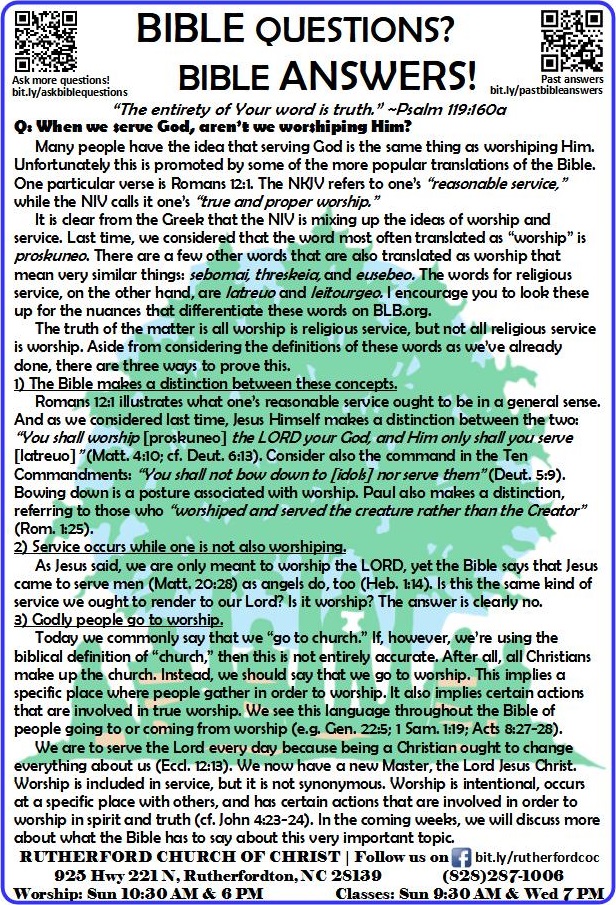 Many people have the idea that serving God is the same thing as worshiping Him. Unfortunately this is promoted by some of the more popular translations of the Bible. One particular verse is Romans 12:1. The NKJV refers to one’s “reasonable service,” while the NIV calls it one’s “true and proper worship.”
Many people have the idea that serving God is the same thing as worshiping Him. Unfortunately this is promoted by some of the more popular translations of the Bible. One particular verse is Romans 12:1. The NKJV refers to one’s “reasonable service,” while the NIV calls it one’s “true and proper worship.”
It is clear from the Greek that the NIV is mixing up the ideas of worship and service. Last time, we considered that the word most often translated as “worship” is proskuneo. There are a few other words that are also translated as worship that mean very similar things: sebomai, threskeia, and eusebeo. The words for religious service, on the other hand, are latreuo and leitourgeo. I encourage you to look these up for the nuances that differentiate these words on BLB.org.
The truth of the matter is all worship is religious service, but not all religious service is worship. Aside from considering the definitions of these words as we’ve already done, there are three ways to prove this.
- The Bible makes a distinction between these concepts.
Romans 12:1 illustrates what one’s reasonable service ought to be in a general sense. And as we considered last time, Jesus Himself makes a distinction between the two: “You shall worship [proskuneo] the LORD your God, and Him only shall you serve [latreuo]” (Matt. 4:10; cf. Deut. 6:13). Consider also the command in the Ten Commandments: “You shall not bow down to [idols] nor serve them” (Deut. 5:9). Bowing down is a posture associated with worship. Paul also makes a distinction, referring to those who “worshiped and served the creature rather than the Creator” (Rom. 1:25). - Service occurs while one is not also worshiping.
As Jesus said, we are only meant to worship the LORD, yet the Bible says that Jesus came to serve men (Matt. 20:28) as angels do, too (Heb. 1:14). Is this the same kind of service we ought to render to our Lord? Is it worship? The answer is clearly no. - Godly people go to worship.
Today we commonly say that we “go to church.” If, however, we’re using the biblical definition of “church,” then this is not entirely accurate. After all, all Christians make up the church. Instead, we should say that we go to worship. This implies a specific place where people gather in order to worship. It also implies certain actions that are involved in true worship. We see this language throughout the Bible of people going to or coming from worship (e.g. Gen. 22:5; 1 Sam. 1:19; Acts 8:27-28).
We are to serve the Lord every day because being a Christian ought to change everything about us (Eccl. 12:13). We now have a new Master, the Lord Jesus Christ. Worship is included in service, but it is not synonymous. Worship is intentional, occurs at a specific place with others, and has certain actions that are involved in order to worship in spirit and truth (cf. John 4:23-24). In the coming weeks, we will discuss more about what the Bible has to say about this very important topic.
Shouldn’t we be more spiritual than religious? table of contents
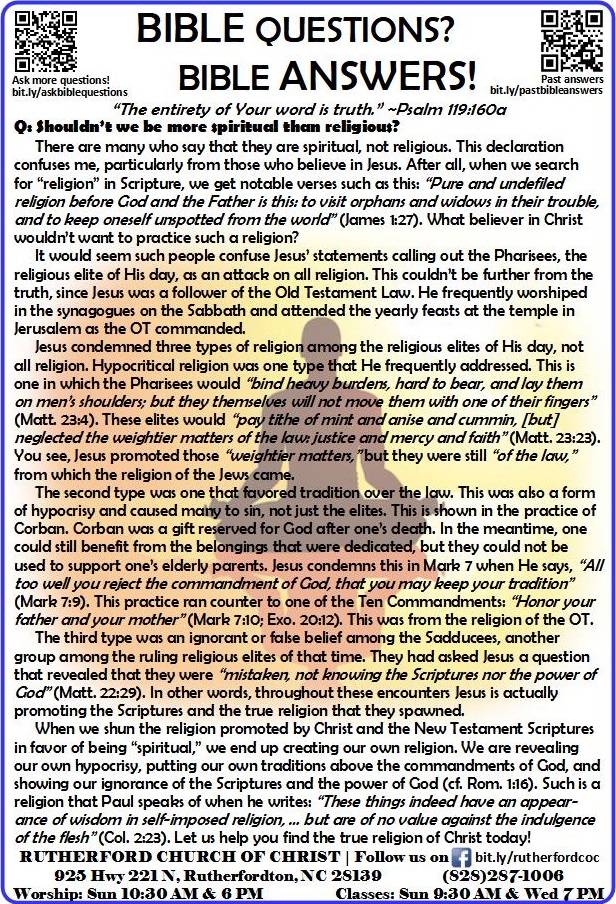 There are many who say that they are spiritual, not religious. This declaration confuses me, particularly from those who believe in Jesus. After all, when we search for “religion” in Scripture, we get notable verses such as this: “Pure and undefiled religion before God and the Father is this: to visit orphans and widows in their trouble, and to keep oneself unspotted from the world” (James 1:27). What believer in Christ wouldn’t want to practice such a religion?
There are many who say that they are spiritual, not religious. This declaration confuses me, particularly from those who believe in Jesus. After all, when we search for “religion” in Scripture, we get notable verses such as this: “Pure and undefiled religion before God and the Father is this: to visit orphans and widows in their trouble, and to keep oneself unspotted from the world” (James 1:27). What believer in Christ wouldn’t want to practice such a religion?
It would seem such people confuse Jesus’ statements calling out the Pharisees, the religious elite of His day, as an attack on all religion. This couldn’t be further from the truth, since Jesus was a follower of the Old Testament Law. He frequently worshiped in the synagogues on the Sabbath and attended the yearly feasts at the temple in Jerusalem as the OT commanded.
Jesus condemned three types of religion among the religious elites of His day, not all religion. Hypocritical religion was one type that He frequently addressed. This is one in which the Pharisees would “bind heavy burdens, hard to bear, and lay them on men’s shoulders; but they themselves will not move them with one of their fingers” (Matt. 23:4). These elites would “pay tithe of mint and anise and cummin, [but] neglected the weightier matters of the law: justice and mercy and faith” (Matt. 23:23). You see, Jesus promoted those “weightier matters,” but they were still “of the law,” from which the religion of the Jews came.
The second type was one that favored tradition over the law. This was also a form of hypocrisy and caused many to sin, not just the elites. This is shown in the practice of Corban. Corban was a gift reserved for God after one’s death. In the meantime, one could still benefit from the belongings that were dedicated, but they could not be used to support one’s elderly parents. Jesus condemns this in Mark 7 when He says, “All too well you reject the commandment of God, that you may keep your tradition” (Mark 7:9). This practice ran counter to one of the Ten Commandments: “Honor your father and your mother” (Mark 7:10; Exo. 20:12). This was from the religion of the OT.
The third type was an ignorant or false belief among the Sadducees, another group among the ruling religious elites of that time. They had asked Jesus a question that revealed that they were “mistaken, not knowing the Scriptures nor the power of God” (Matt. 22:29). In other words, throughout these encounters Jesus is actually promoting the Scriptures and the true religion that they spawned.
When we shun the religion promoted by Christ and the New Testament Scriptures in favor of being “spiritual,” we end up creating our own religion. We are revealing our own hypocrisy, putting our own traditions above the commandments of God, and showing our ignorance of the Scriptures and the power of God (cf. Rom. 1:16). Such is a religion that Paul speaks of when he writes: “These things indeed have an appearance of wisdom in self-imposed religion, … but are of no value against the indulgence of the flesh” (Col. 2:23). Let us help you find the true religion of Christ today!
Is there a wrong way to worship God today? table of contents
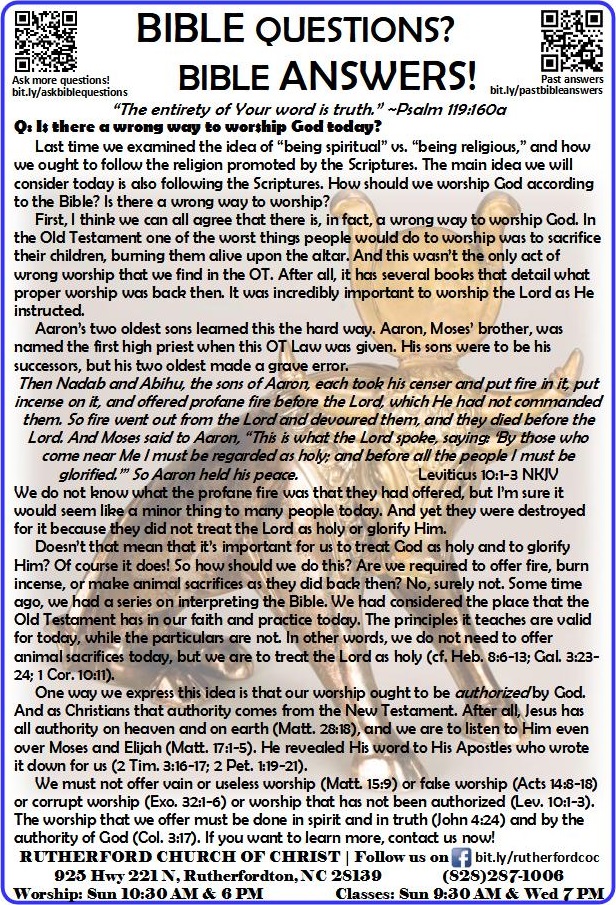 Last time we examined the idea of “being spiritual” vs. “being religious,” and how we ought to follow the religion promoted by the Scriptures. The main idea we will consider today is also following the Scriptures. How should we worship God according to the Bible? Is there a wrong way to worship?
Last time we examined the idea of “being spiritual” vs. “being religious,” and how we ought to follow the religion promoted by the Scriptures. The main idea we will consider today is also following the Scriptures. How should we worship God according to the Bible? Is there a wrong way to worship?
First, I think we can all agree that there is, in fact, a wrong way to worship God. In the Old Testament one of the worst things people would do to worship was to sacrifice their children, burning them alive upon the altar. And this wasn’t the only act of wrong worship that we find in the OT. After all, it has several books that detail what proper worship was back then. It was incredibly important to worship the Lord as He instructed.
Aaron’s two oldest sons learned this the hard way. Aaron, Moses’ brother, was named the first high priest when this OT Law was given. His sons were to be his successors, but his two oldest made a grave error.
Then Nadab and Abihu, the sons of Aaron, each took his censer and put fire in it, put incense on it, and offered profane fire before the Lord, which He had not commanded them. So fire went out from the Lord and devoured them, and they died before the Lord. And Moses said to Aaron, “This is what the Lord spoke, saying: ‘By those who come near Me I must be regarded as holy; and before all the people I must be glorified.’” So Aaron held his peace.
Leviticus 10:1-3 NKJV
We do not know what the profane fire was that they had offered, but I’m sure it would seem like a minor thing to many people today. And yet they were destroyed for it because they did not treat the Lord as holy or glorify Him.
Doesn’t that mean that it’s important for us to treat God as holy and to glorify Him? Of course it does! So how should we do this? Are we required to offer fire, burn incense, or make animal sacrifices as they did back then? No, surely not. Some time ago, we had a series on interpreting the Bible. We had considered the place that the Old Testament has in our faith and practice today. The principles it teaches are valid for today, while the particulars are not. In other words, we do not need to offer animal sacrifices today, but we are to treat the Lord as holy (cf. Heb. 8:6-13; Gal. 3:23-24; 1 Cor. 10:11).
One way we express this idea is that our worship ought to be authorized by God. And as Christians that authority comes from the New Testament. After all, Jesus has all authority on heaven and on earth (Matt. 28:18), and we are to listen to Him even over Moses and Elijah (Matt. 17:1-5). He revealed His word to His Apostles who wrote it down for us (2 Tim. 3:16-17; 2 Pet. 1:19-21).
We must not offer vain or useless worship (Matt. 15:9) or false worship (Acts 14:8-18) or corrupt worship (Exo. 32:1-6) or worship that has not been authorized (Lev. 10:1-3). The worship that we offer must be done in spirit and in truth (John 4:24) and by the authority of God (Col. 3:17). If you want to learn more, contact us now!
What is the proper way to worship God? table of contents
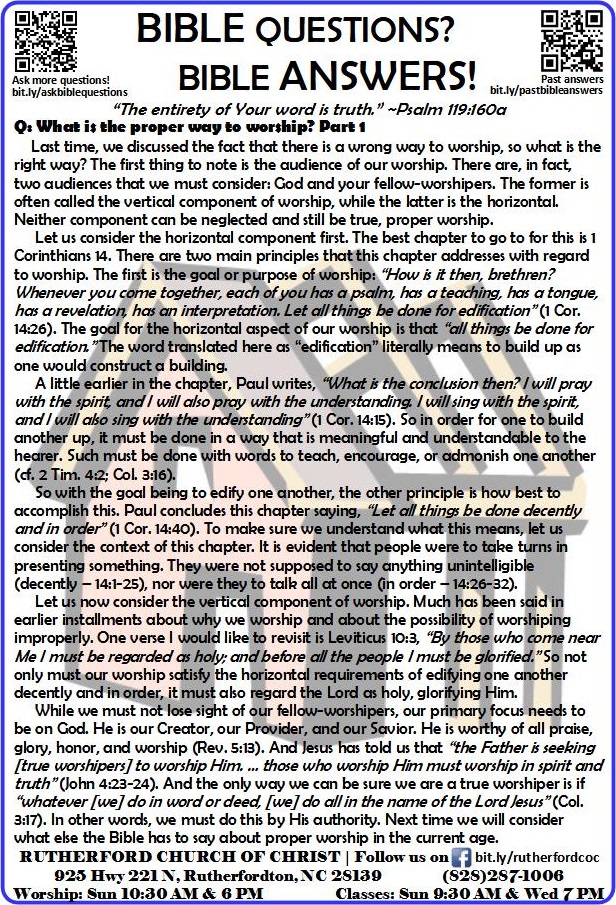 Last time, we discussed the fact that there is a wrong way to worship, so what is the right way? The first thing to note is the audience of our worship. There are, in fact, two audiences that we must consider: God and your fellow-worshipers. The former is often called the vertical component of worship, while the latter is the horizontal. Neither component can be neglected and still be true, proper worship.
Last time, we discussed the fact that there is a wrong way to worship, so what is the right way? The first thing to note is the audience of our worship. There are, in fact, two audiences that we must consider: God and your fellow-worshipers. The former is often called the vertical component of worship, while the latter is the horizontal. Neither component can be neglected and still be true, proper worship.
Let us consider the horizontal component first. The best chapter to go to for this is 1 Corinthians 14. There are two main principles that this chapter addresses with regard to worship. The first is the goal or purpose of worship: “How is it then, brethren? Whenever you come together, each of you has a psalm, has a teaching, has a tongue, has a revelation, has an interpretation. Let all things be done for edification” (1 Cor. 14:26). The goal for the horizontal aspect of our worship is that “all things be done for edification.” The word translated here as “edification” literally means to build up as one would construct a building.
A little earlier in the chapter, Paul writes, “What is the conclusion then? I will pray with the spirit, and I will also pray with the understanding. I will sing with the spirit, and I will also sing with the understanding” (1 Cor. 14:15). So in order for one to build another up, it must be done in a way that is meaningful and understandable to the hearer. Such must be done with words to teach, encourage, or admonish one another (cf. 2 Tim. 4:2; Col. 3:16).
So with the goal being to edify one another, the other principle is how best to accomplish this. Paul concludes this chapter saying, “Let all things be done decently and in order” (1 Cor. 14:40). To make sure we understand what this means, let us consider the context of this chapter. It is evident that people were to take turns in presenting something. They were not supposed to say anything unintelligible (decently – 14:1-25), nor were they to talk all at once (in order – 14:26-32).
Let us now consider the vertical component of worship. Much has been said in earlier installments about why we worship and about the possibility of worshiping improperly. One verse I would like to revisit is Leviticus 10:3, “By those who come near Me I must be regarded as holy; and before all the people I must be glorified.” So not only must our worship satisfy the horizontal requirements of edifying one another decently and in order, it must also regard the Lord as holy, glorifying Him.
While we must not lose sight of our fellow-worshipers, our primary focus needs to be on God. He is our Creator, our Provider, and our Savior. He is worthy of all praise, glory, honor, and worship (Rev. 5:13). And Jesus has told us that “the Father is seeking [true worshipers] to worship Him. … those who worship Him must worship in spirit and truth” (John 4:23-24). And the only way we can be sure we are a true worshiper is if “whatever [we] do in word or deed, [we] do all in the name of the Lord Jesus” (Col. 3:17). In other words, we must do this by His authority. Next time we will consider what else the Bible has to say about proper worship in the current age.
Part 2
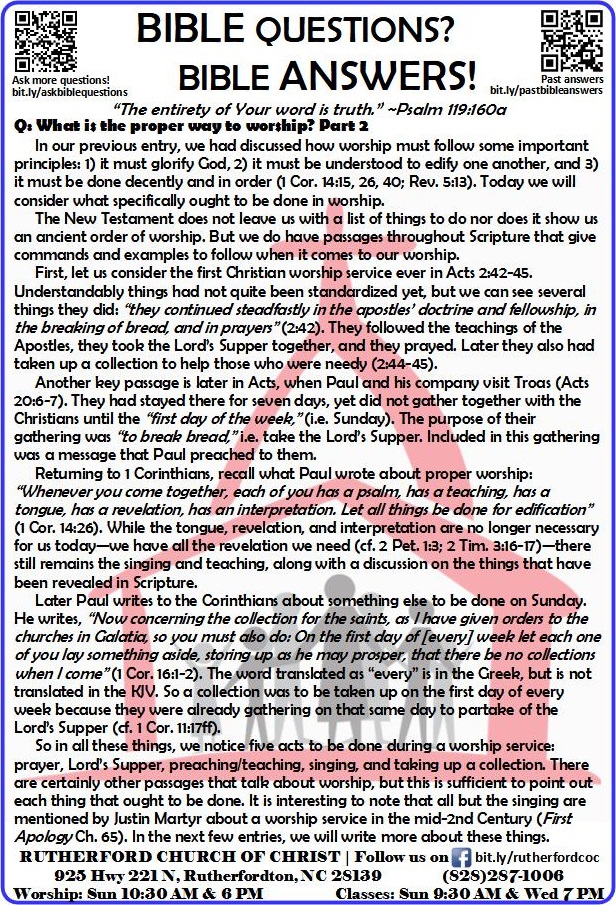 In our previous entry, we had discussed how worship must follow some important principles: 1) it must glorify God, 2) it must be understood to edify one another, and 3) it must be done decently and in order (1 Cor. 14:15, 26, 40; Rev. 5:13). Today we will consider what specifically ought to be done in worship.
In our previous entry, we had discussed how worship must follow some important principles: 1) it must glorify God, 2) it must be understood to edify one another, and 3) it must be done decently and in order (1 Cor. 14:15, 26, 40; Rev. 5:13). Today we will consider what specifically ought to be done in worship.
The New Testament does not leave us with a list of things to do nor does it show us an ancient order of worship. But we do have passages throughout Scripture that give commands and examples to follow when it comes to our worship.
First, let us consider the first Christian worship service ever in Acts 2:42-45. Understandably things had not quite been standardized yet, but we can see several things they did: “they continued steadfastly in the apostles’ doctrine and fellowship, in the breaking of bread, and in prayers” (2:42). They followed the teachings of the Apostles, they took the Lord’s Supper together, and they prayed. Later they also had taken up a collection to help those who were needy (2:44-45).
Another key passage is later in Acts, when Paul and his company visit Troas (Acts 20:6-7). They had stayed there for seven days, yet did not gather together with the Christians until the “first day of the week,” (i.e. Sunday). The purpose of their gathering was “to break bread,” i.e. take the Lord’s Supper. Included in this gathering was a message that Paul preached to them.
Returning to 1 Corinthians, recall what Paul wrote about proper worship: “Whenever you come together, each of you has a psalm, has a teaching, has a tongue, has a revelation, has an interpretation. Let all things be done for edification” (1 Cor. 14:26). While the tongue, revelation, and interpretation are no longer necessary for us today—we have all the revelation we need (cf. 2 Pet. 1:3; 2 Tim. 3:16-17)—there still remains the singing and teaching, along with a discussion on the things that have been revealed in Scripture.
Later Paul writes to the Corinthians about something else to be done on Sunday. He writes, “Now concerning the collection for the saints, as I have given orders to the churches in Galatia, so you must also do: On the first day of [every] week let each one of you lay something aside, storing up as he may prosper, that there be no collections when I come” (1 Cor. 16:1-2). The word translated as “every” is in the Greek, but is not translated in the KJV. So a collection was to be taken up on the first day of every week because they were already gathering on that same day to partake of the Lord’s Supper (cf. 1 Cor. 11:17ff).
So in all these things, we notice five acts to be done during a worship service: prayer, Lord’s Supper, preaching/teaching, singing, and taking up a collection. There are certainly other passages that talk about worship, but this is sufficient to point out each thing that ought to be done. It is interesting to note that all but the singing are mentioned by Justin Martyr about a worship service in the mid-2nd Century (First Apology Ch. 65). In the next few entries, we will write more about these things.
How should we pray? table of contents
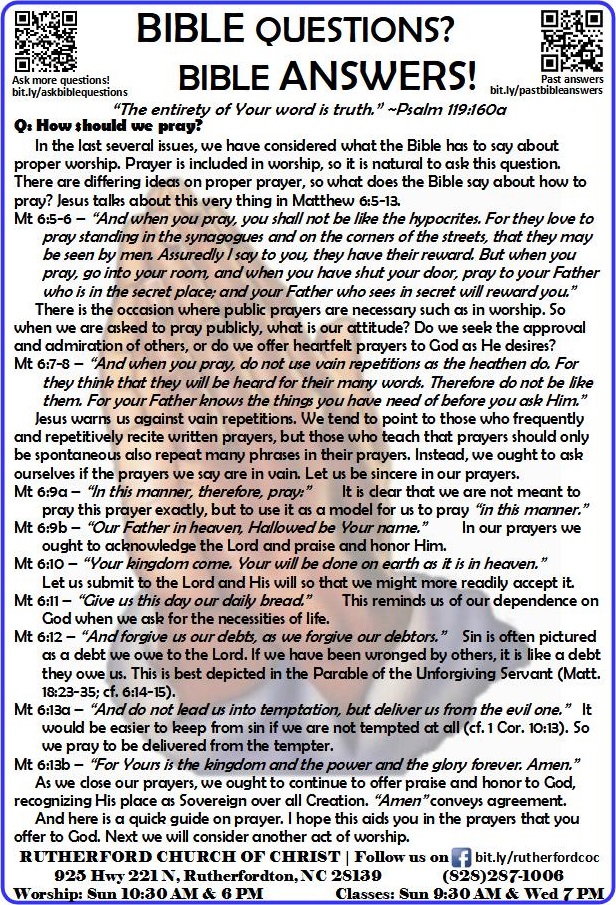 In the last several issues, we have considered what the Bible has to say about proper worship. Prayer is included in worship, so it is natural to ask this question. There are differing ideas on proper prayer, so what does the Bible say about how to pray? Jesus talks about this very thing in Matthew 6:5-13.
In the last several issues, we have considered what the Bible has to say about proper worship. Prayer is included in worship, so it is natural to ask this question. There are differing ideas on proper prayer, so what does the Bible say about how to pray? Jesus talks about this very thing in Matthew 6:5-13.
Matt 6:5-6 – “And when you pray, you shall not be like the hypocrites. For they love to pray standing in the synagogues and on the corners of the streets, that they may be seen by men. Assuredly I say to you, they have their reward. But when you pray, go into your room, and when you have shut your door, pray to your Father who is in the secret place; and your Father who sees in secret will reward you.”
There is the occasion where public prayers are necessary such as in worship. So when we are asked to pray publicly, what is our attitude? Do we seek the approval and admiration of others, or do we offer heartfelt prayers to God as He desires?
Matt 6:7-8 – “And when you pray, do not use vain repetitions as the heathen do. For they think that they will be heard for their many words. Therefore do not be like them. For your Father knows the things you have need of before you ask Him.”
Jesus warns us against vain repetitions. We tend to point to those who frequently and repetitively recite written prayers, but those who teach that prayers should only be spontaneous also repeat many phrases in their prayers. Instead, we ought to ask ourselves if the prayers we say are in vain. Let us be sincere in our prayers.
Matt 6:9a – “In this manner, therefore, pray:”
It is clear that we are not meant to pray this prayer exactly, but to use it as a model for us to pray “in this manner.”
Matt 6:9b – “Our Father in heaven, Hallowed be Your name.”
In our prayers we ought to acknowledge the Lord and praise and honor Him.
Matt 6:10 – “Your kingdom come. Your will be done on earth as it is in heaven.”
Let us submit to the Lord and His will so that we might more readily accept it.
Matt 6:11 – “Give us this day our daily bread.”
This reminds us of our dependence on God when we ask for the necessities of life.
Matt 6:12 – “And forgive us our debts, as we forgive our debtors.”
Sin is often pictured as a debt we owe to the Lord. If we have been wronged by others, it is like a debt they owe us. This is best depicted in the Parable of the Unforgiving Servant (Matt. 18:23-35; cf. 6:14-15).
Matt 6:13a – “And do not lead us into temptation, but deliver us from the evil one.”
It would be easier to keep from sin if we are not tempted at all (cf. 1 Cor. 10:13). So we pray to be delivered from the tempter.
Matt 6:13b – “For Yours is the kingdom and the power and the glory forever. Amen.”
As we close our prayers, we ought to continue to offer praise and honor to God, recognizing His place as Sovereign over all Creation. “Amen” conveys agreement.
And here is a quick guide on prayer. I hope this aids you in the prayers that you offer to God. Next we will consider another act of worship.
What is the Lord’s Supper? Part 1: Name and Elements table of contents
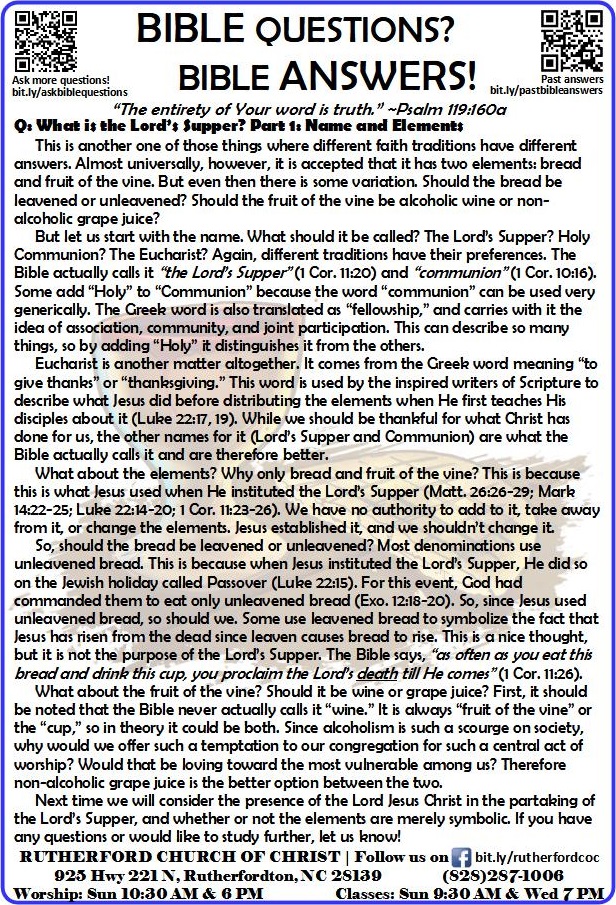 This is another one of those things where different faith traditions have different answers. Almost universally, however, it is accepted that it has two elements: bread and fruit of the vine. But even then there is some variation. Should the bread be leavened or unleavened? Should the fruit of the vine be alcoholic wine or non-alcoholic grape juice?
This is another one of those things where different faith traditions have different answers. Almost universally, however, it is accepted that it has two elements: bread and fruit of the vine. But even then there is some variation. Should the bread be leavened or unleavened? Should the fruit of the vine be alcoholic wine or non-alcoholic grape juice?
But let us start with the name. What should it be called? The Lord’s Supper? Holy Communion? The Eucharist? Again, different traditions have their preferences. The Bible actually calls it “the Lord’s Supper” (1 Cor. 11:20) and “communion” (1 Cor. 10:16). Some add “Holy” to “Communion” because the word “communion” can be used very generically. The Greek word is also translated as “fellowship,” and carries with it the idea of association, community, and joint participation. This can describe so many things, so by adding “Holy” it distinguishes it from the others.
Eucharist is another matter altogether. It comes from the Greek word meaning “to give thanks” or “thanksgiving.” This word is used by the inspired writers of Scripture to describe what Jesus did before distributing the elements when He first teaches His disciples about it (Luke 22:17, 19). While we should be thankful for what Christ has done for us, the other names for it (Lord’s Supper and Communion) are what the Bible actually calls it and are therefore better.
What about the elements? Why only bread and fruit of the vine? This is because this is what Jesus used when He instituted the Lord’s Supper (Matt. 26:26-29; Mark 14:22-25; Luke 22:14-20; 1 Cor. 11:23-26). We have no authority to add to it, take away from it, or change the elements. Jesus established it, and we shouldn’t change it.
So, should the bread be leavened or unleavened? Most denominations use unleavened bread. This is because when Jesus instituted the Lord’s Supper, He did so on the Jewish holiday called Passover (Luke 22:15). For this event, God had commanded them to eat only unleavened bread (Exo. 12:18-20). So, since Jesus used unleavened bread, so should we. Some use leavened bread to symbolize the fact that Jesus has risen from the dead since leaven causes bread to rise. This is a nice thought, but it is not the purpose of the Lord’s Supper. The Bible says, “as often as you eat this bread and drink this cup, you proclaim the Lord’s death till He comes” (1 Cor. 11:26).
What about the fruit of the vine? Should it be wine or grape juice? First, it should be noted that the Bible never actually calls it “wine.” It is always “fruit of the vine” or the “cup,” so in theory it could be both. Since alcoholism is such a scourge on society, why would we offer such a temptation to our congregation for such a central act of worship? Would that be loving toward the most vulnerable among us? Therefore non-alcoholic grape juice is the better option between the two.
Next time we will consider the presence of the Lord Jesus Christ in the partaking of the Lord’s Supper, and whether or not the elements are merely symbolic. If you have any questions or would like to study further, let us know!
What is the Lord’s Supper? Part 2: Literal or Symbolic? table of contents
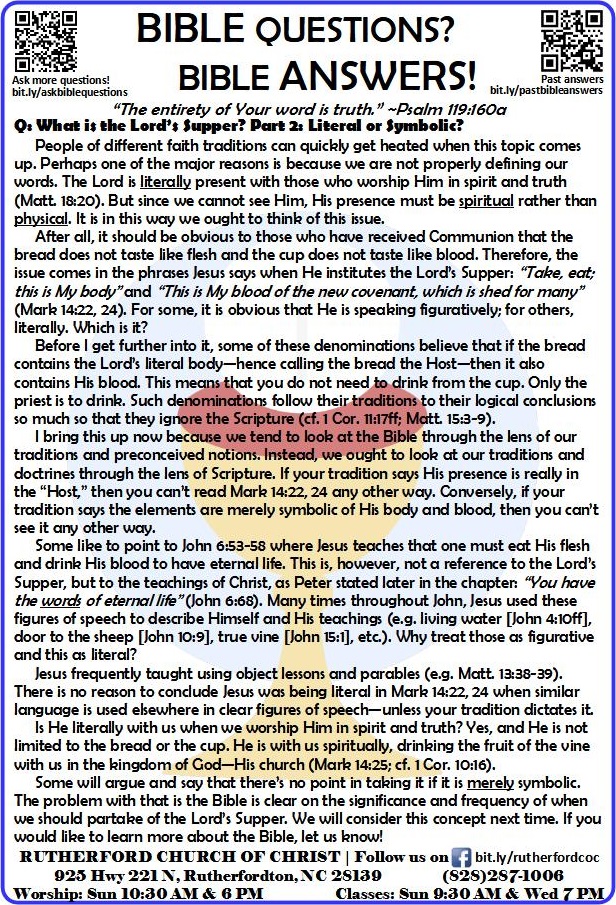 People of different faith traditions can quickly get heated when this topic comes up. Perhaps one of the major reasons is because we are not properly defining our words. The Lord is literally present with those who worship Him in spirit and truth (Matt. 18:20). But since we cannot see Him, His presence must be spiritual rather than physical. It is in this way we ought to think of this issue.
People of different faith traditions can quickly get heated when this topic comes up. Perhaps one of the major reasons is because we are not properly defining our words. The Lord is literally present with those who worship Him in spirit and truth (Matt. 18:20). But since we cannot see Him, His presence must be spiritual rather than physical. It is in this way we ought to think of this issue.
After all, it should be obvious to those who have received Communion that the bread does not taste like flesh and the cup does not taste like blood. Therefore, the issue comes in the phrases Jesus says when He institutes the Lord’s Supper: “Take, eat; this is My body” and “This is My blood of the new covenant, which is shed for many” (Mark 14:22, 24). For some, it is obvious that He is speaking figuratively; for others, literally. Which is it?
Before I get further into it, some of these denominations believe that if the bread contains the Lord’s literal body—hence calling the bread the Host—then it also contains His blood. This means that you do not need to drink from the cup. Only the priest is to drink. Such denominations follow their traditions to their logical conclusions so much so that they ignore the Scripture (cf. 1 Cor. 11:17ff; Matt. 15:3-9).
I bring this up now because we tend to look at the Bible through the lens of our traditions and preconceived notions. Instead, we ought to look at our traditions and doctrines through the lens of Scripture. If your tradition says His presence is really in the “Host,” then you can’t read Mark 14:22, 24 any other way. Conversely, if your tradition says the elements are merely symbolic of His body and blood, then you can’t see it any other way.
Some like to point to John 6:53-58 where Jesus teaches that one must eat His flesh and drink His blood to have eternal life. This is, however, not a reference to the Lord’s Supper, but to the teachings of Christ, as Peter stated later in the chapter: “You have the words of eternal life” (John 6:68). Many times throughout John, Jesus used these figures of speech to describe Himself and His teachings (e.g. living water [John 4:10ff], door to the sheep [John 10:9], true vine [John 15:1], etc.). Why treat those as figurative and this as literal?
Jesus frequently taught using object lessons and parables (e.g. Matt. 13:38-39). There is no reason to conclude Jesus was being literal in Mark 14:22, 24 when similar language is used elsewhere in clear figures of speech—unless your tradition dictates it.
Is He literally with us when we worship Him in spirit and truth? Yes, and He is not limited to the bread or the cup. He is with us spiritually, drinking the fruit of the vine with us in the kingdom of God—His church (Mark 14:25; cf. 1 Cor. 10:16).
Some will argue and say that there’s no point in taking it if it is merely symbolic. The problem with that is the Bible is clear on the significance and frequency of when we should partake of the Lord’s Supper. We will consider this concept next time. If you would like to learn more about the Bible, let us know!
When should we take the Lord’s Supper? table of contents
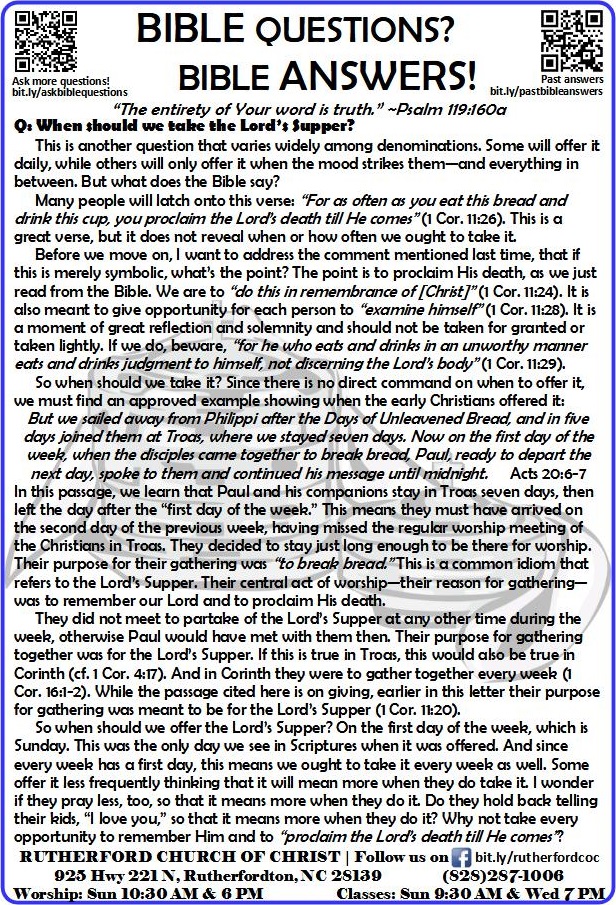 This is another question that varies widely among denominations. Some will offer it daily, while others will only offer it when the mood strikes them—and everything in between. But what does the Bible say?
This is another question that varies widely among denominations. Some will offer it daily, while others will only offer it when the mood strikes them—and everything in between. But what does the Bible say?
Many people will latch onto this verse: “For as often as you eat this bread and drink this cup, you proclaim the Lord’s death till He comes” (1 Cor. 11:26). This is a great verse, but it does not reveal when or how often we ought to take it.
Before we move on, I want to address the comment mentioned last time, that if this is merely symbolic, what’s the point? The point is to proclaim His death, as we just read from the Bible. We are to “do this in remembrance of [Christ]” (1 Cor. 11:24). It is also meant to give opportunity for each person to “examine himself” (1 Cor. 11:28). It is a moment of great reflection and solemnity and should not be taken for granted or taken lightly. If we do, beware, “for he who eats and drinks in an unworthy manner eats and drinks judgment to himself, not discerning the Lord’s body” (1 Cor. 11:29).
So when should we take it? Since there is no direct command on when to offer it, we must find an approved example showing when the early Christians offered it:
But we sailed away from Philippi after the Days of Unleavened Bread, and in five days joined them at Troas, where we stayed seven days. Now on the first day of the week, when the disciples came together to break bread, Paul, ready to depart the next day, spoke to them and continued his message until midnight.
Acts 20:6-7
In this passage, we learn that Paul and his companions stay in Troas seven days, then left the day after the “first day of the week.” This means they must have arrived on the second day of the previous week, having missed the regular worship meeting of the Christians in Troas. They decided to stay just long enough to be there for worship. Their purpose for their gathering was “to break bread.” This is a common idiom that refers to the Lord’s Supper. Their central act of worship—their reason for gathering—was to remember our Lord and to proclaim His death.
They did not meet to partake of the Lord’s Supper at any other time during the week, otherwise Paul would have met with them then. Their purpose for gathering together was for the Lord’s Supper. If this is true in Troas, this would also be true in Corinth (cf. 1 Cor. 4:17). And in Corinth they were to gather together every week (1 Cor. 16:1-2). While the passage cited here is on giving, earlier in this letter their purpose for gathering was meant to be for the Lord’s Supper (1 Cor. 11:20).
So when should we offer the Lord’s Supper? On the first day of the week, which is Sunday. This was the only day we see in Scriptures when it was offered. And since every week has a first day, this means we ought to take it every week as well. Some offer it less frequently thinking that it will mean more when they do take it. I wonder if they pray less, too, so that it means more when they do it. Do they hold back telling their kids, “I love you,” so that it means more when they do it? Why not take every opportunity to remember Him and to “proclaim the Lord’s death till He comes”?
What about tithing? table of contents
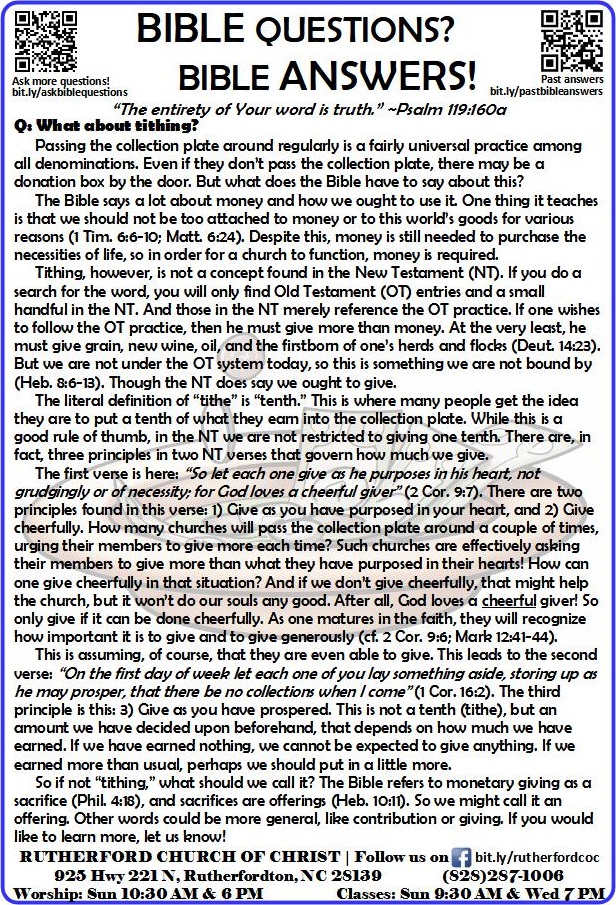 Passing the collection plate around regularly is a fairly universal practice among all denominations. Even if they don’t pass the collection plate, there may be a donation box by the door. But what does the Bible have to say about this?
Passing the collection plate around regularly is a fairly universal practice among all denominations. Even if they don’t pass the collection plate, there may be a donation box by the door. But what does the Bible have to say about this?
The Bible says a lot about money and how we ought to use it. One thing it teaches is that we should not be too attached to money or to this world’s goods for various reasons (1 Tim. 6:6-10; Matt. 6:24). Despite this, money is still needed to purchase the necessities of life, so in order for a church to function, money is required.
Tithing, however, is not a concept found in the New Testament (NT). If you do a search for the word, you will only find Old Testament (OT) entries and a small handful in the NT. And those in the NT merely reference the OT practice. If one wishes to follow the OT practice, then he must give more than money. At the very least, he must give grain, new wine, oil, and the firstborn of one’s herds and flocks (Deut. 14:23). But we are not under the OT system today, so this is something we are not bound by (Heb. 8:6-13). Though the NT does say we ought to give.
The literal definition of “tithe” is “tenth.” This is where many people get the idea they are to put a tenth of what they earn into the collection plate. While this is a good rule of thumb, in the NT we are not restricted to giving one tenth. There are, in fact, three principles in two NT verses that govern how much we give.
The first verse is here: “So let each one give as he purposes in his heart, not grudgingly or of necessity; for God loves a cheerful giver” (2 Cor. 9:7). There are two principles found in this verse: 1) Give as you have purposed in your heart, and 2) Give cheerfully. How many churches will pass the collection plate around a couple of times, urging their members to give more each time? Such churches are effectively asking their members to give more than what they have purposed in their hearts! How can one give cheerfully in that situation? And if we don’t give cheerfully, that might help the church, but it won’t do our souls any good. After all, God loves a cheerful giver! So only give if it can be done cheerfully. As one matures in the faith, they will recognize how important it is to give and to give generously (cf. 2 Cor. 9:6; Mark 12:41-44).
This is assuming, of course, that they are even able to give. This leads to the second verse: “On the first day of week let each one of you lay something aside, storing up as he may prosper, that there be no collections when I come” (1 Cor. 16:2). The third principle is this: 3) Give as you have prospered. This is not a tenth (tithe), but an amount we have decided upon beforehand, that depends on how much we have earned. If we have earned nothing, we cannot be expected to give anything. If we earned more than usual, perhaps we should put in a little more.
So if not “tithing,” what should we call it? The Bible refers to monetary giving as a sacrifice (Phil. 4:18), and sacrifices are offerings (Heb. 10:11). So we might call it an offering. Other words could be more general, like contribution or giving. If you would like to learn more, let us know!